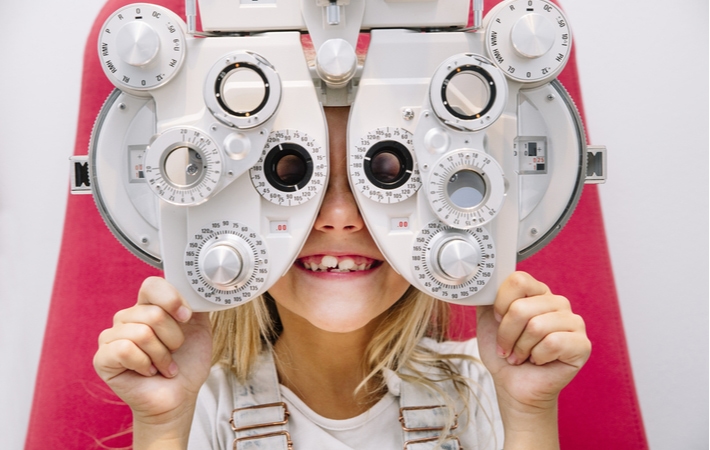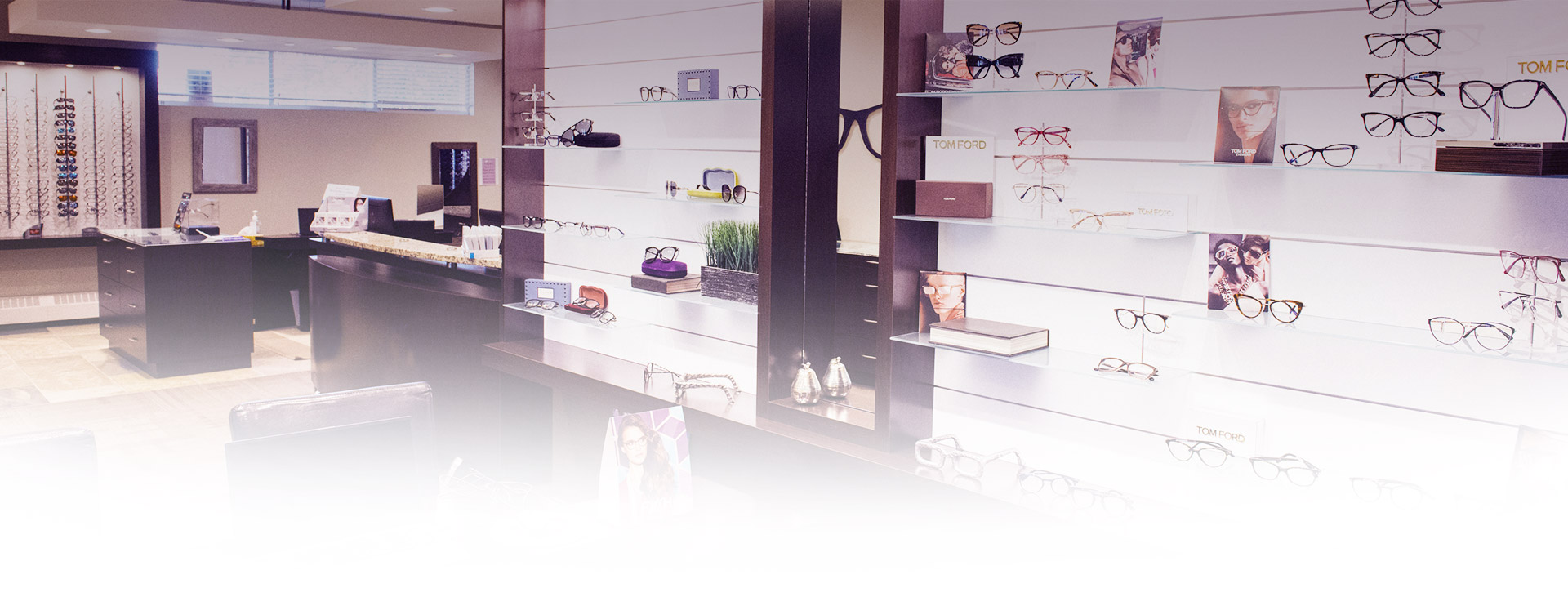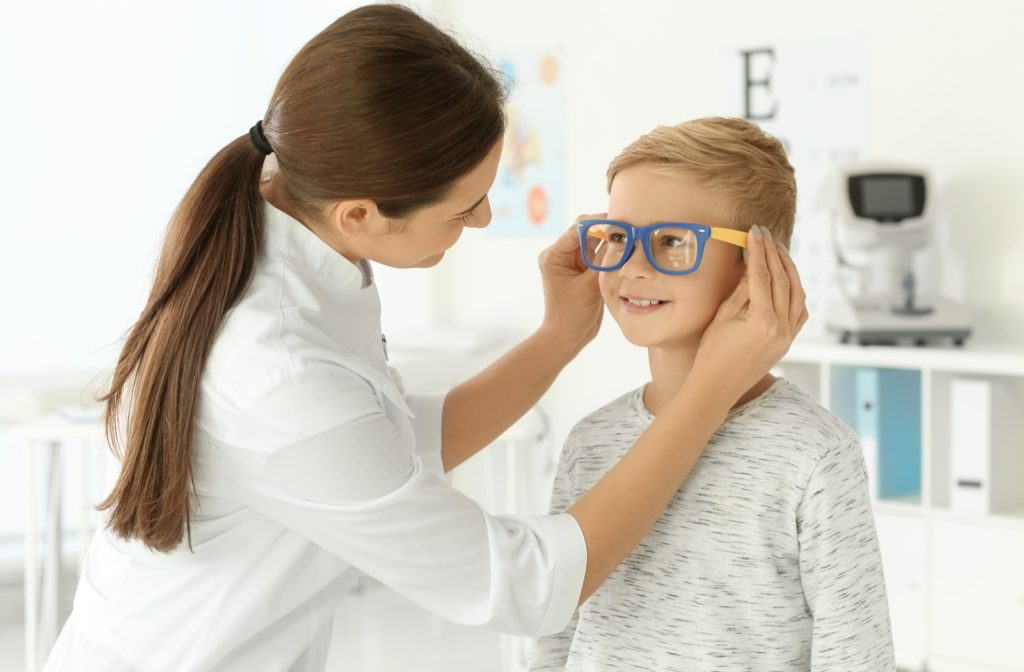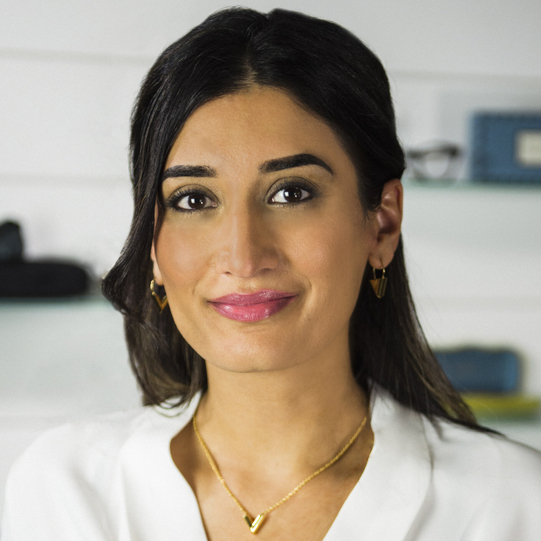Parents are their children’s best advocates for eyesight, and it’s imperative to monitor their visual centres starting at an early age. The Canadian Association of Optometrists (CAO) recommends that a child’s first eye exam occur between 6 and 9 months old.
There are many details to consider when determining if a child has healthy eyesight. At Visionary Eye Centre, we strive to provide every young patient with the clearest vision possible. Our children’s eye exams include tests for multiple indicators of a functional visual system.
We look closely at:
- Eye teaming: Both eyes work together to track an object
- Tracking: The eyes’ ability to lock on a target
- Focusing: The eyes’ ability to stay focused during distance changes
- Visual acuity: The ability to see clearly at close and far distances
- Hand-eye coordination: The ability to combine motor function and visual skills
Signs of Vision Problems in Children
Here are a few indicators that your child may have a vision problem:
- Your child frequently rubs their eyes
- Your child often squints
- Your child tilts their head when looking at objects
- Your child holds reading material close to their face
- Your child covers one eye to look at an object
- Your child complains of headaches
- Your child complains of fatigue
- Your child often loses their place while reading
Regular eye exams are the best way to identify and address childhood vision problems, paving the way for healthier eyesight in the future. If your child has difficulties seeing clearly, contact an optometrist right away.
Common Vision Problems in Children
Myopia
Myopia has a more popular nickname: nearsightedness. This condition occurs when the eye’s shape becomes over-elongated, causing light to bend incorrectly, leading to images focusing at the front of the retina.
Myopia results in distant objects appearing out of focus, blurry, or distorted in the visual field.
Myopia is a prevalent visual problem in children, with experts predicting that nearly half the world’s population will show symptoms of this condition by 2050.
We recommend contacting an optometrist if your child shows any of the following symptoms:
- Frequent squinting
- Appears unaware of objects in the distance
- Needs to sit close to the front of a classroom, movie screen, theatre, or television
- Blinks frequently
- Excessive eye rubbing
Hyperopia
Hyperopia is more commonly known as farsightedness, occurring when the eyeball is shorter than usual from front to back, creating a focal point behind the retina. This condition results in distant objects appearing clear, and closer objects appearing blurry.
Common symptoms of hyperopia include:
- Difficulties concentrating
- Difficulties focusing on near objects
- Blurry vision
- Eye strain
- Headaches
- Aching eyes
- Burning eyes
- Issues with reading or other close-up tasks
Amblyopia
More commonly known as lazy eye, amblyopia is a condition that generally develops in early childhood, requiring regular care and monitoring. Untreated cases of amblyopia may lead to permanent vision problems.
Symptoms of amblyopia in your child may include:
- An eye that wanders outward or inward
- Frequent squinting
- Regularly closing one eye
- Tilting their head when examining an object
- Eyes not working together
Strabismus
Strabismus is also known as crossed eyes, and it typically develops in the early years of a child’s life.
This lifelong condition can be caused by poor muscle control, significantly affecting the alignment of a child’s eyes, possibly resulting in vision problems like depth perception issues or double vision.
Symptoms of strabismus may include:
- Noticeable issues with depth perception
- Eyes are not moving together
- Excessive blinking
- Excessive squinting

The Importance of Regular Eye Care for Kids
There are multiple developmental milestones to reach on the road to adulthood, and several of these milestones involve a child’s visual centres. At Visionary Eye Centre, we recommend that our youngest patients have regular eye exams at every developmental stage, especially:
Between the ages of 8 and 20, the human eye generally experiences a significant change in shape. Undiagnosed vision issues in this age group can severely affect a student’s love of learning. Parents should ensure their school-aged children have annual eye exams to help encourage academic success.
Your optometrist’s goal should be happy and healthy eyes. Contact your eye care team to discuss routine eye care, and get your child started on their path to healthier vision.
Healthy Vision Starts Here
At home, you are the best judge of your child’s vision. If you notice any of the symptoms mentioned above, contact your optometrist right away for an appointment.
The easiest way to get ahead of vision problems is through your child’s regular eye exams. Routine eye care can help confirm that your child’s eyes are developing as they should, and ensure that any vision problems are caught and managed in the earliest stages.
Our children deserve to see as clearly as possible. The team at Visionary Eye Centre can help your child feel confident in their eyesight –nothing makes us happier than smiling, healthy, and happy eyes!



